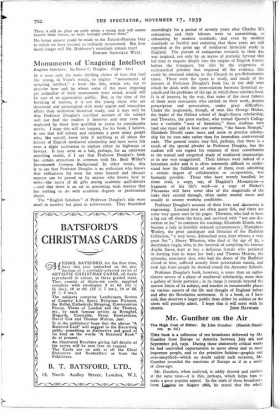Monuments of Unageing Intellect
English Scholars. By David C. Douglas. (Cape. 15s.)
IF it were only the more thrilling claims of love that lead the young, in Yeats's words, to neglect "monuments of unageing intellect," a book like this, which sets out to describe how and by whom some of the most imposing yet unfamiliar of these monuments were raised, would still be sure of an appreciative public. But, in the time of the breaking of nations, it is not the young alone who are distracted and preoccupied with more urgent and immediate affairs than mediaeval historical study, and it may well be that Professor Douglas's excellent account of the subject will not find the readers it deserves and may even be neglected by those best qualified to assess its considerable merits. I hope this will not happen, for his book, I believe, is one that will inform and entertain a great many people who, like myself, know little if anything at all about the history of English mediaeval scholarship and have never felt even a slight inclination to explore either its highways or byways. It may serve as a bait, perhaps, for an otherwise unwilling reader, if I say that Professor Douglas's book has certain attractions in common with Mr. Basil Willey's Seventeenth Century Background. In other words, this is to say that Professor Douglas is an enthusiast who knows that enthusiasm for even the most learned and obscure matters can be passed on by anyone who knows how to write—the rarest of all gifts among academic quill-drivers —and that there is an art in presenting such matters that has nothing to do with academic degrees or professorial chairs.
The " English Scholars " of Professor Douglas's title were small in number but great in achievement. They flourished
exceedingly for a period of seventy years after Charles II's restoration, and their labours were so unremitting, so exhausting by modern standards, and even by modern standards so fruitful and enduring that these years are still regarded as the great age of mediaeval historical study in England. The pursuit of antiquarian research in their day was inspired, not only by an access of patriotic fervour that led men to enquire deeply into the origins of English history before the Conquest, but also by the exigencies of ecclesiastical polemic that required all the evidence that could be obtained relating to the Church in pre-Reformation times. These were the spurs to study, and much of the interest of Professor Douglas's book lies in the skill with which he deals with the inter-relation between historical re- search and the problems of the age in which these scholars lived. It is of interest, by the way, that some of the most famous of them were non-jurors who carried on their work, despite prescription and persecution, under great difficulties. Under the inspiration, though, of men like George Hickes, the leader of the Oxford school of Anglo-Saxon scholarship, and Thwaites, the great teacher, who turned Queen's College into a veritable " nest of Saxonists," these studious men (and one must add at least one woman, " the Saxon Nymph," Elizabeth Elstob) came more and more to practise scholar- ship for its own sake rather than for immediate controversial ends. The general reader may feel, perhaps, that there is a touch of the special pleader in Professor Douglas, but the student will not regard his estimate of their contribution to the textual and exegetical study of mediaeval manuscripts as in any way exaggerated. Their labours were indeed of a herculean order and it is often extremely difficult to under- stand how the fulfilment of some of them, even admitting a certain degree of collaboration or co-operation, was humanly possible. Those who have merely handled, let alone read, a copy, say, of Dugdale's Monasticon—a fragment of his life's work—or a copy of Hickes's Thesaurus will have some idea of the magnitude of the tasks they carried through, often under mental stress and usually in uneasy working conditions.
Professor Douglas's account of their lives and characters is engrossing. Learned men are often queer fish, and there are some very queer ones in his pages. Thwaites, who had to have a leg cut off above the knee, and survived with " not one dis- tortion or ho," to continue his teaching; Elizabeth Elstob, who became a lady in horribly reduced circumstances ; Humphrey Wanley, the great cataloguer and librarian of the Harleian Collection, " a very loose, debauched man, kept whores, a very great Sot " ; Henry Wharton, who died at the age of 3o, a doctrinaire virgin, who, in the intervals of compiling his famous
Anglia Sacra, kept at bay a delicious female who persisted
in inviting him to share her bed ; and Thomas Hearne, the splenetic, non-juror don, who had the doors of the Bodleian closed to him, suffered acutely from persecution mania, and took tips from people he showed round the Anatomy Schools. Professor Douglas's book, however, is more than an autho- ritative survey of a phase of mediaeval scholarship, more than a gallery of lively portraits ; in its range it extends beyond the narrow limits of its subject, and touches in innumerable places on various aspects of the life and thought of England before and after the Revolution settlement. It is a book, as I have said, that deserves a larger public than either its subject or the times will possibly admit. I hope that it will meet with its




































































 Previous page
Previous page